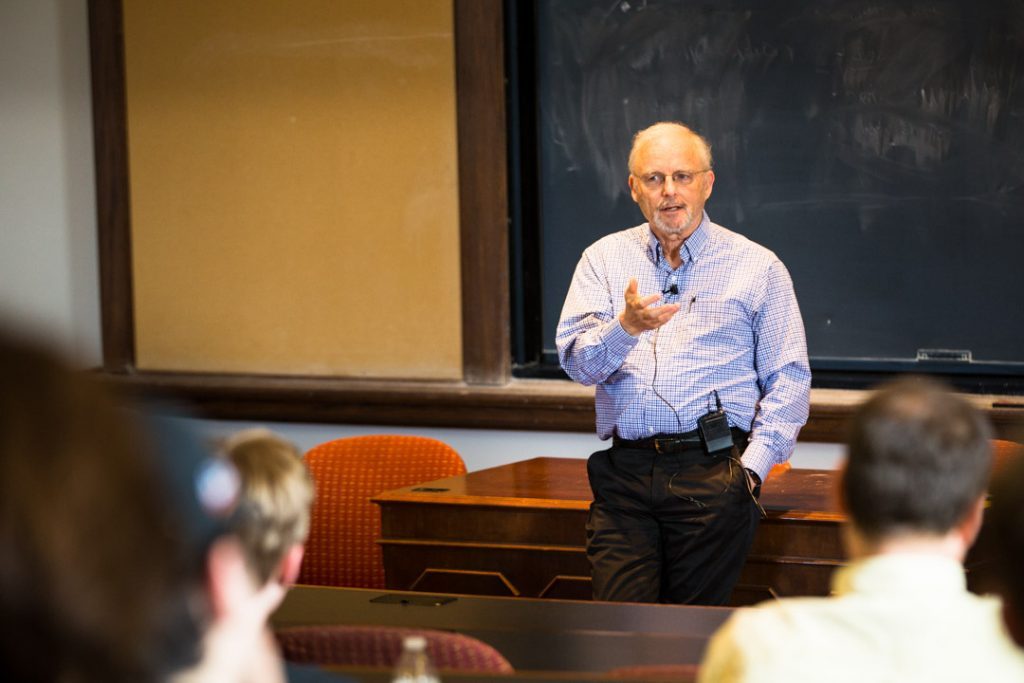The Nature Necessity
There is a way to boost creativity, reduce stress, and enhance your overall health and well-being. It might sound like a too-good-to-be-true miracle drug. But it’s not. It’s as simple as going outside.
Louv spoke on campus recently about the tremendous value of spending time outdoors, and the ill effects kids, adults, and society can suffer if such experiences are neglected. When Louv wrote Last Child in the Woods: Saving Our Children from Nature-Deficit Disorder (2005), the positive impact of nature on physical and mental health was more anecdotal than evidential. The book became a celebrated best-seller, making “nature deficit disorder” part of the national dialogue, especially among parents, educators, and researchers.
Today, thanks to Louv’s influence, there is a substantial body of evidence that proves nature does the body and psyche good, and negative consequences (obesity, attention disorders, and depression) arise when screen time overrules outdoor time.
Here is advice you can give your student to thrive in a world that’s increasingly plugged in, as well as taking the advice yourself!
- Don’t Lose Hope! “If you ask Americans to conjure up images in their mind about the far future, the images that come up are almost always of something that could be from a post-apocalyptic movie,” Louv said. “We are raising kids in a culture that is telling them that it’s too late, that the damage is done. And we carry that around with us. Instead, we want students to see hope in the movement.” He said that he believes a shift needs to be made in how we approach and talk about environmentalism so future generations can see that they can still make a positive impact on the world.
- Help Diversify the Field … “The big environmental organizations are not diverse,” Louv said. “The membership is like me—old, white guys. They are aware of this, and they are trying to make changes. I’m hoping that continues. We need kids from all backgrounds to want to be environmentalists.”
- … and Your Backyard “I like to talk about ‘nature-rich’ schools and homes and neighborhoods and cities, so you start to see native species come back, and start to feed the food chain,” he said. “I believe that citizens can become engines of biodiversity. My wife and I changed our backyard to native species, and all of a sudden we are seeing California-native butterflies and bees and lizards. Why is it we see ourselves alone on the planet so much? Why do we see it as just our yard? What if it was the next yard and the next yard and the next yard, so that suddenly we had wildlife corridors going through our cities? You’d have insects, and birds, and the whole chain. And what if it went from city to city? We could have worldwide homegrown parks. Why are we waiting for governments to do this?”
- Connect with Other Species “I believe we need to focus on animals and the relationship we have with them,” he said. “I don’t think we focus on our relationships with other creatures enough and the fact that there is something between us—not just companion animals but also wild animals. Why is it that we only talk about one species? I think we need to live in symbiosis with other life, and that we need to approach our future that way—even in the densest of neighborhoods. Why is it that the urban parks with the highest biodiversity have the highest impact on human health? Because you are not alone. We need other life. We need other creatures. We need a new relationship with nature that’s not only about people.”
- Embrace a Hybrid Mind “We are creating environments in schools and houses and cities that are focused on technology and screens,” he said. “When you are looking at screens, you are working to cut out other senses in order for you to focus on the screen. If a child grows up sitting on the couch playing video games, certain special senses that are developed when out in the natural world atrophy. Ideal students have two sets of skills—they can use technology, but they can also function in the real world with full senses. They know the world via virtual reality and real experiences. I think that should be the focus: to develop the hybrid minds of the future.”
Through his writing and his speaking, Louv aims to inspire (current and future) educators, health professionals, parents, developers, and conservationists to take action—starting right in their own backyards—to embrace the transformative and restorative powers of nature. Not only will doing so help us build better communities and economies, he said, but it will enhance our own health and well-being, and relationships with those around us.
While Louv is pleased with the progress made as evidenced by such programs as Family Nature Clubs—networks of people who have formed communities that gather for group outings—and the Every Kid in a Park campaign, he said more work is needed, especially as society becomes increasingly plugged in—“The more high-tech we become, the more nature we need.”
Katrin Neitz
Communications
neitzk@lafayette.edu
(610) 330-5750
